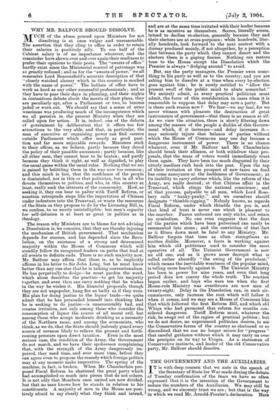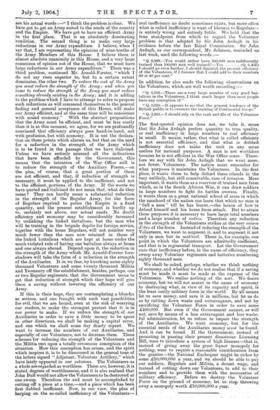I T is with deep concern that we note in the
speech of the Secretary of State for War made during the debate of Tuesday confirmation of the fears we have so often expressed that it is the intention of the Government to reduce the numbers of the Auxiliaries. We may still be wrong, and we sincerely trust we are ; but that is the way in which we read Mr. Arnold-Forster's declaration. Here are his actual words :—" I think the problem is clear. We have got to get an Army suited to the needs of the country and the Empire. We have got to have an efficient Army in the first place. That is an absolutely dominating 'condition. The second thing is to make very large reductions in our Army expenditure. I believe, when I 'say that, I am representing the opinions of nine-tenths of the Army Members of this House. I believe there is almost absolute unanimity in this House, and a, very large consensus of opinion out of the House, that we must have large reductions in our Army expenditure." There was a third problem, continued Mr. Arnold-Forster, "which I do not say rises superior to, but to a certain extent dominates, the other two. To reduce the cost of the Army you must reduce the strength, of the Army ; and when you come to reduce the strength of the Army you must reduce something already existing in, the Army; and it is adding to the problem which I have to attempt to solve to propose such reductions as will commend themselves to the general feeling and general acceptance of this House, will make our Army efficient, and at the same time will be consistent with sound economy." With the abstract propositions that the Army must be efficient, and must be less costly than it is at this moment, we agree, for we are profoundly convinced that efficiency always goes band-in-band, not with profusion, but with economy. It is not the declara- tion on these points which alarms us, but that on the need for a reduction in the strength of the Army which is to be found in the passage that we have italicised. Unless we have entirely misread all the indications that have been afforded by the Government, this means that the intention of the War Office still is to reduce the strength of the Auxiliary Forces,—on the plea, of course, that a great portion of them are not efficient, and that, if reduction of strength is necessary, it must be applied to the inefficient, and not to the efficient, portions of. the Army. If the words we have quoted and italicised do not mean that, what do they mean ? They can hardly mean a substantial reduction in the strength of the Regular Army, for the force of Regulars required to police the Empire is a fixed quantity, and the present establishment is hardly up to, certainly not above, our actual needs. No doubt efficiency and economy may be considerably increased by unlinking the linked battalions, but the men who will be training in the brigade depots for foreign service, together with the home Regulars, will not number very much fewer than the men now retained in those of the linked battalions which are kept at home under the much violated rule of having one battalion always at home and one always abroad. Depend upon it, the reduction in the strength of the Army which Mr. Arnold-Forster fore- shadows will take the form of a reduction in the strength of the Auxiliaries. It is, we fear, by knocking some eighty thousand Volunteers and some twenty thousand Militia and Yeomanry off the establishment, besides, perhaps, one or two-Regular regiments, that the Government mean to get that reduction of strength which they hope will give them a saving without lowering the efficiency of our Army.
If this is their hope, they are contemplating a blundei so serious, and one fraught with such vast possibilities for evil, that we are bound, even at the risk of wearying our readers, to make the strongest protest that it is in our power to make. If we reduce the strength of our Auxiliaries in order to save a little money to be spent in other directionS, we shall be making a capital error, and one which we shall some day dearly repent. We want to increase the numbers of our Auxiliaries, and especially of our Volunteers, not to decrease them. These schemes for reducing the strength of the Volunteers and the Militia rest upon a totally erroneous conception of the situation. How this conception has arisen, and the spirit which inspires it, is to be discovered in the general tone of the letters signed "Adjutant, Volunteer Artillery," which have lately appeared in our columns. The Volunteers as a whole are regarded as worthless. There are, however, it is stated, degrees of worthlessness, and it is also realised that John -Bull would not allow the Volunteers to be destroyed at one swoop. Therefore the end must be accomplished by cutting of a piece at a time,—and. a piece which has been first dubbed inefficient. Now, in our view, the plan of harping on the so-called inefficiency of the Volunteers— real inefficiency no doubt sometimes exists, but more often what is called inefficiency is want of likeness to Regulars— is entirely wrong and entirely futile. We hold that the true standpoint from which to regard the Volunteer problem is that adopted by Sir John Ardagh in bis evidence before the last Royal Commission. Sir John Ardagh, as our correspondent, Mr. Johnson, reminded us last week, used the following words :— "Q. 3,399.—You would rather have 300,000 men indifferently
trained than 100,000 men well trained ?—Yes (Q. 3,401) I should go even further, I should diminish the present efficiency of the Volunteers, if I foresaw that I could add to their numbers 30 or 40 per cent."
In addition, he also made the following observations on the Volunteers, which are well worth recording :— " Q. 3,316.—There are a very large number of very good bat- talions in the Volunteers, I think much larger than most people have any conception of."
"Q. 3,328.—It appears to me that the general tendency of the British public is to overrate the training of Continental troops.
"Q. 3,331.-1 should rely on the rank and file of the Volunteer Force."
The first-quoted opinion does not, we take it, mean that Sir John Ardagh prefers quantity to true quality, or real inefficiency in large numbers to real efficiency in small. It means, rather, that what is called efficiency is not essential efficiency, and that what • is dubbed inefficiency does not make the unit in any sense useless for national purposes. A man is not worthless because he is not efficient in the War Office sense. There- fore we say with Sir John Ardagh that we want more, not fewer, Volunteers. The nation must remember for what purposes it maintains the Volunteers. In the first place, it wants them to help defend these islands in the very unlikely, but still conceivable, case of invasion. More important, it wants them as a reservoir of trained men from which, as in the South African War, it can draw soldiers in large numbers to fight its battles oversea. Finally, it wants them as a great national school of arms in which the manhood of the nation can learn that which no man is "full a man" till he has learnt,—the lesson of how to defend himself and his home from attack.. But to attain these purposes it is necessary to have large total numbers and a large number of cadres. Therefore any reduction in the strength of the Volunteers strikes at the very raison d'être of the force. Instead of reducing the strength of the Volunteers, we want to augment it, and to augment it not only in men but in materiel. There is, for example, one point in which the Volunteers are admittedly inefficient, and that is in regimental transport. Let the Government cure that inefficiency before, in the name of efficiency, they sweep away Volunteer regiments and batteries numbering eighty, thousand men.
We shall be asked, perhaps, whether we think nothing of economy, and whether we do not realise that if a saving must be made it must be made at the expense of the Volunteers. We realise nothing of the sort. We desire economy, but we will not assent in the name of economy to destroying what, in view of its capacity and spirit, is the least costly military force in. the world. By all means let us save money, and save it in millions, but let us do so by cutting down waste and extravagance, and not by sacrificing the Volunteer Force in order to save some £400,000. But even if the Government cannot, or will not, save by means of a less extravagant and less waste, ful administration, let us refuse to impair the strength of the Auxiliaries. We want economy, but for the essential needs of the Auxiliaries money must be found. And it can be found. If the Government, instead of persisting in passing their present disastrous Licensing Bill, were to introduce a system of high licenses—that is, instead, of giving away the great liquor monopoly for nothing, were to require a reasonable consideration from the grantee—the National Exchequer might be richer by some £10,000,000 a year, and we should be able to pay our soldiers, Regulars and Militia, a decent wage, and instead of cutting down our Volunteers, to add to their numbers and to provide them with the necessaries of military efficiency. Before we destroy the Volunteer Force on the ground of economy, let us stop throwing away a monopoly worth .R10,000,000 a year.















































 Previous page
Previous page